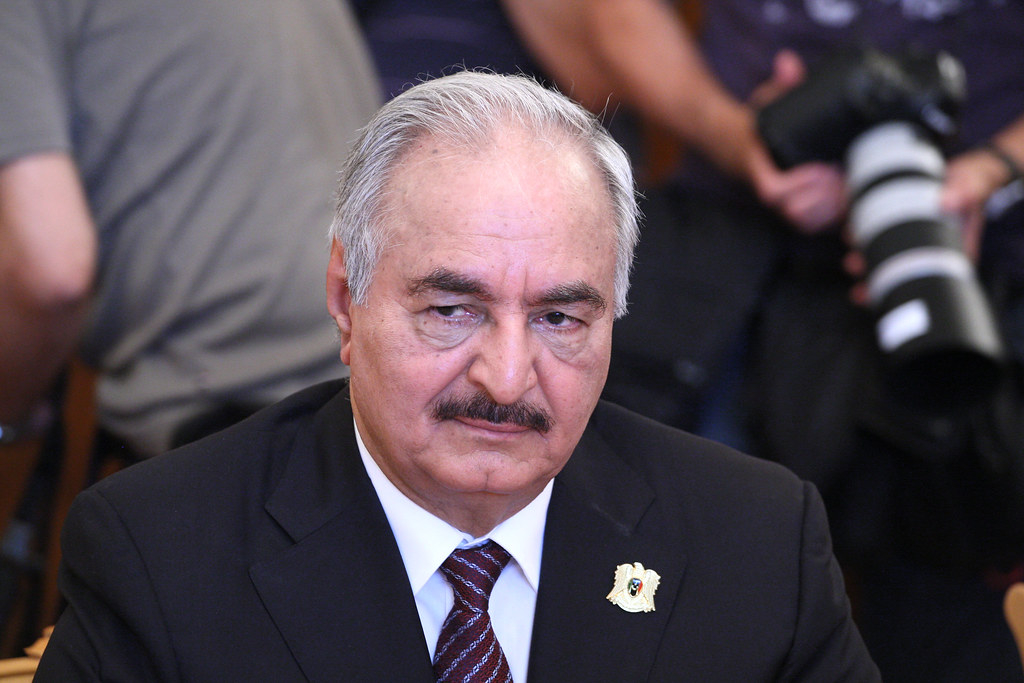by Ahmed Charai • December 27th
Turkey, which signed a military and economic accord with the Libyan government in November, could deprive Greece and the Greek Cypriots of large swaths of their oil and gas exploration areas and force Egypt and Israel to negotiate with Turkey over the construction of natural gas pipelines to Europe.
The threat posed by extremists in Libya and Tunisia is not one that Europeans can ignore, as evidenced by the attack on British tourists in Sousse and the more recent attack by Tunisian Anis Amri in Berlin.

Turkish President Recep Tayyip Erdogan opened the way on December 26 for direct military intervention in Libya: he announced a parliamentary vote in early January on sending troops to support the UN-backed Tripoli government against General Khalifa Haftar (pictured). (Image source: Russian Foreign Ministry/Flickr)
Turkish President Recep Tayyip Erdogan opened the way on December 26 for direct military intervention in Libya: he announced a parliamentary vote in early January on sending troops to support the UN-backed Tripoli government against General Khalifa Haftar. Instructors, equipment and Turkish special forces are already operating in Libya alongside pro-government militias. Erdogan said that Turkey would also be willing to send aerial and naval assistance if circumstances require it.
Sending Turkish troops will complicate the situation in an already fragile country, torn by internal dissent since the ouster and killing of the dictator Muammar Gaddafi in 2011.
by Khaled Abu Toameh • December 27th
The Palestinian Authority leadership was far from pleased about AMAN's exposure of the Palestinians public's discontent with corruption.
Palestinian leaders fear that reports about corruption could contribute to a drying up of international funding of the PA. If donor countries got whiff of the fact that their taxpayers' money is being squandered and stolen by senior PA officials, the cash cow might just kick over the PA bucket.
The statement by Transparency International is a clear indication of the campaign of threats and intimidation its representatives have been facing since the release of the corruption survey. The statement implies that AMAN was forced to withdraw its public opinion poll after its staff received threats from the PA leadership.
Mahmoud Abbas also apparently wants to make sure that donor countries continue to channel funds to his government without noticing that a majority of Palestinians are complaining about corruption.

Palestinian leaders fear that reports about corruption could contribute to a drying up of international funding of the Palestinian Authority. If donor countries got whiff of the fact that their taxpayers' money is being squandered and stolen by senior PA officials, the cash cow might just kick over the PA bucket. (Image source: iStock)
Palestinian Authority leaders are upset: a survey published on December 11 by Transparency International, a global organization that "gives voice to the victims and witnesses of corruption," found that corruption is increasing in the PA and in five Arab countries.
Transparency International said that its survey, called "Global Corruption Barometer (GCB) – Middle East and North Africa," revealed that "almost two-thirds of all people (65%) in six countries surveyed think that corruption is getting worse in their country, and that their governments are not doing enough to end corruption."
The GCB report, one of the largest, most detailed surveys of citizens' views on corruption and experiences of bribery, incorporates the views of more than 6,600 citizens from Jordan, Lebanon, Morocco, Palestine, Sudan and Tunisia, according to Transparency International.
|
|
|
No comments:
Post a Comment